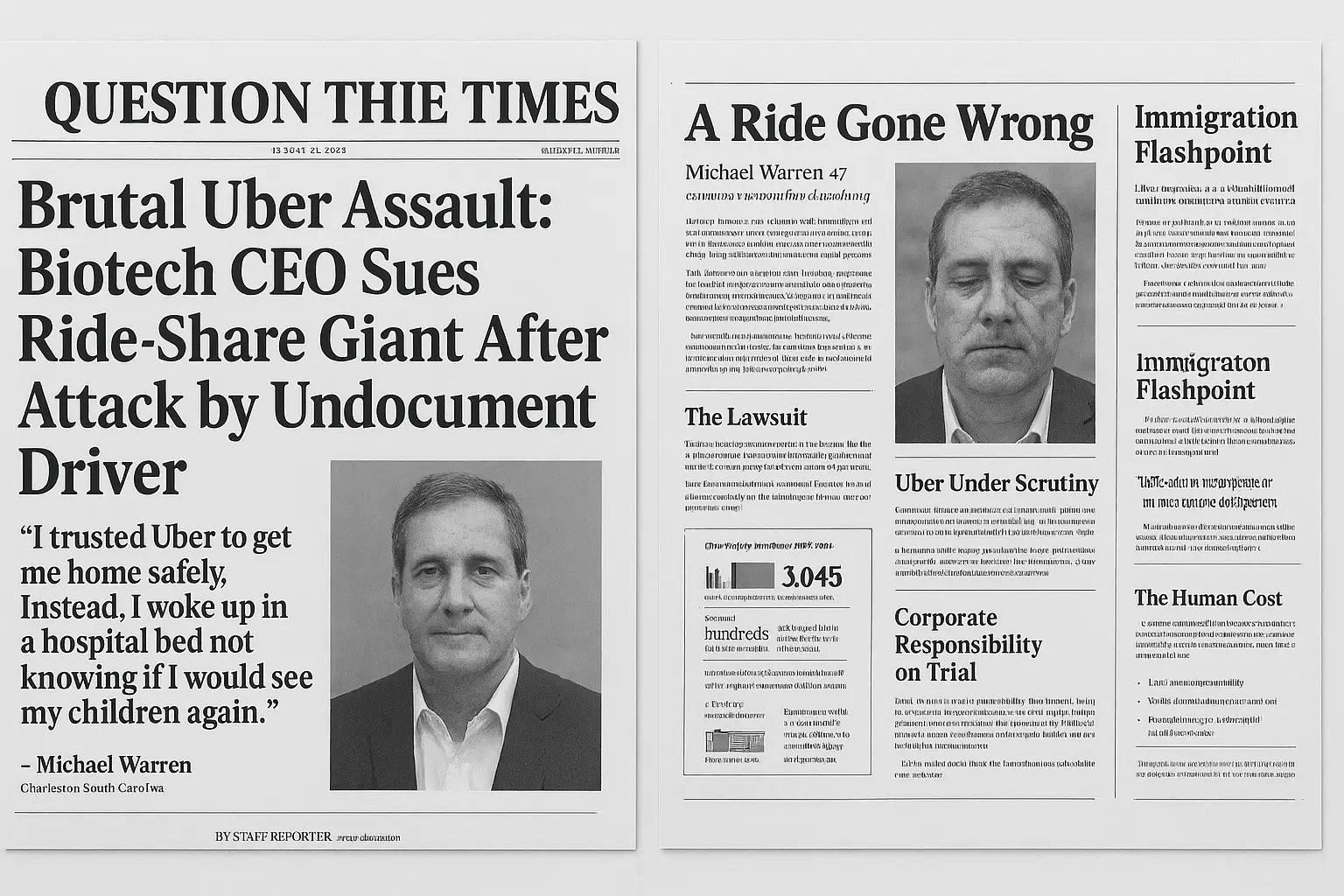Brutal Uber Assault: South Carolina CEO Sues Ride-Share Giant After Attack by Undocumented Driver
By Staff Reporter: | Charleston, South Carolina | Sunday, August 22, 2025
“I trusted Uber to get me home safely. Instead, I woke up in a hospital bed not knowing if I would see my children again.”
— Michael Warren, biotech CEO
A Routine Ride Turns Into a Nightmare
On a warm Charleston evening last month, Michael Warren — father, husband, and chief executive of a thriving South Carolina biotech firm — ordered an Uber for what he thought would be an uneventful ride home. Instead, he ended the night unconscious in a hospital bed, his face bloodied, his bones fractured, and his family fearing the worst.
According to witnesses and police reports, the Uber driver launched a violent attack in a Mount Pleasant parking lot after a dispute over the designated drop-off point. Warren, 47, was beaten to the ground and left bleeding heavily until bystanders intervened.
The driver — since arrested — is now at the centre of a storm reaching far beyond Charleston. He is an undocumented immigrant who, despite lacking legal work authorisation, was ferrying paying customers on one of America’s largest ride-share platforms.
A Lawsuit with National Implications
Warren is now suing Uber for millions in damages, accusing the company of gross negligence, reckless hiring, and endangering public safety. His legal team argues that Uber “cut corners” in vetting the driver, thereby allowing someone with no legal right to work in the country to transport passengers.
“This was not an isolated mistake,” said Warren’s attorney, James Stratton. “It was foreseeable, it was preventable, and it was the direct result of a company prioritising profit over passenger safety.”
Uber has confirmed that the driver has been permanently banned from its platform and insists it is cooperating fully with authorities. In a statement, the company said: “The safety of our riders is our top priority. We take reports of violence extremely seriously.”
Yet the lawsuit threatens to expose vulnerabilities in Uber’s business model: its reliance on mass recruitment of drivers, its background check procedures, and its insistence that drivers are independent contractors rather than employees.
Sidebar: Uber’s Safety Record
-
3,045 sexual assaults reported in the U.S. on Uber trips between 2019–2022 (company transparency report).
-
Hundreds of reported physical assaults in the same period.
-
Uber does not use fingerprint-based vetting common to traditional taxi firms.
-
Background checks rely heavily on electronic databases — vulnerable to fraud.
Immigration Flashpoint
The discovery that the driver was undocumented has poured fuel on South Carolina’s already heated debate about border security and immigration enforcement.
Governor Henry McMaster condemned the incident as “a tragic failure of the system,” while Senator Rebecca Callahan called it “the predictable consequence of weak corporate oversight and federal inaction.”
Immigration and Customs Enforcement (ICE) confirmed it has custody of the driver, though officials declined to disclose whether he had a prior record. Local sources suggested he had been involved in previous altercations.
Immigrant rights groups, however, caution against broad generalisations. “One violent act should not define millions of hardworking immigrants,” said Ana Morales, director of the Charleston Immigrant Resource Centre. “But yes, corporations like Uber must be held accountable for who they allow to drive passengers.”
Corporate Responsibility on Trial
Warren’s lawsuit is not merely about damages — it cuts to the heart of a wider issue: should companies like Uber be held to the same standards as traditional transport providers?
“Uber has long argued it is a technology platform, not an employer,” explained Caroline Bennett, a former federal prosecutor turned legal analyst. “That distinction has protected it from liability in many cases. But here, with an undocumented driver accused of a violent crime, the courts may be less sympathetic.”
If successful, Warren’s case could open the floodgates for similar suits from victims of assaults linked to ride-share drivers.
Pull Quote
“If it can happen to Mike — a successful, respected CEO — it can happen to anyone. He did nothing wrong but trust a service millions of us use every day.”
— Colleague of Michael Warren
The Human Cost
For Warren, the ordeal has been both physical and psychological. He suffered a concussion, facial fractures, and deep lacerations. More than that, he says, was the shock of waking in hospital with no memory of how he arrived there.
“I thought I might never see my family again,” he said in a written statement. His recovery continues at home, where he remains on medical leave.
Colleagues describe him as resilient but deeply shaken. His company, which employs over 200 people in Charleston, has placed him temporarily on leave while he undergoes treatment.
A Case with Broader Echoes
The Warren case encapsulates three of America’s most sensitive debates:
-
Immigration enforcement — and whether undocumented workers slip through the cracks of corporate systems.
-
Ride-share accountability — and how far companies must go to ensure passenger safety.
-
Corporate liability — in a gig economy where the lines between employer and contractor remain blurred.
A preliminary hearing is scheduled for early September. Uber is expected to fight the claims vigorously, but legal experts say the optics are damning.
“This is not just another civil suit,” said Professor David Harper, transportation policy expert at the University of South Carolina. “It’s a test case — and its outcome will resonate across the ride-share industry.”
For Warren and his family, however, the matter is simpler: “I want accountability,” he says. “Not just for myself, but to make sure no one else goes through what I did.”
